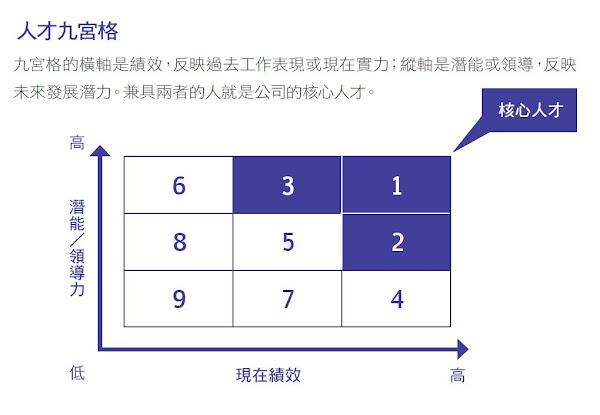
Author: Associate Professor, Institute of Human Resource Management, Chung-Ang University/Lin Wenzheng
"Talents" are self-centered, planning for individuals or small units they lead, regardless of the overall interests of the organization, and their contribution to the company is always greater than their self-interest. For the sake of long-term development and talent accumulation, enterprises should defend their talents and expel their talents.
In the past year, the head of the human resources department and I closely observed the performance of more than 20 mid- and high-level elite executives selected by a company through the "Talent Nine Grids" (see the figure below).

The judgement of the competency of the supervisor: the company puts the first, or does he give priority?
After a year's observation, almost all elite managers have some common characteristics: first-class mind, domineering, resolute, ambitious, etc., and of course, they also have proud performance, however, I think the most fundamental difference between unfit and competent managers is that they are "self-centered" or "company-centric"?
"Self-centered" managers are unfit managers who often put self-interest ahead of the company's interests. In the above-mentioned companies, several business department directors are domineering and arbitrary because of their personal achievements, asking others to cooperate in everything, or squeezing out or even harming the interests of other departments because of the importance of their departments. There are also bullies among these people, who leave no room for those who are inferior to themselves, and often show arrogant and indulgent tones or eyes, and there are also arrogant people who take advantage of the opportunity to repair talented subordinates. I call these types of supervisors "overlords".
Like self-centered executives, "company-centric" managers are talented and occasionally prioritize personal interests, but their contribution to the company is always greater than their self-interest, so it doesn't affect the big picture. They sometimes make people feel aggressive and not easy to get close to, but they are domineering but not domineering, decisive but not arbitrary, arrogant but not arrogant, have greater self-control and introspection for self-interested behavior, and once someone hints or mentions, they will have the courage to admit and correct. I call these directors "heroes."
Hegemony with strong self-centeredness will do more harm than good to the organization
Li Yan of Shu Han was outstanding, and when Liu Bei was dying, he entrusted his successor Liu Chan to him and Zhuge Liang to assist him. Once, when Cao Zhen of Wei came to attack, Zhuge Liang prepared to send an army to attack a force of Wei, and at the same time, in order to strengthen the defense force of Hanzhong, he asked Li Yan to lead 20,000 horses to Hanzhong. Li Yan was dissatisfied with being transferred out of Jiangzhou, so he privately fabricated rumors that Sima Yi wanted to surrender from a high position, and Zhuge Liang had to promote him to hussar general, and his son to be the governor of Jiangzhou, so that his son could stay in Jiangzhou's territory, and Li Yan was willing to accept the order to lead the army into Hanzhong.
The following year, Zhuge Liang went out of the Northern Expedition of Qishan and appointed Li Yan to be responsible for the transportation of grain and grass. At that time, it was raining and the roads were muddy, and it was impossible to transport grain and grass in time to support the front line.
When Zhuge Liang returned to the court, he pretended to be shocked and said, "The army is sufficient, why withdraw the troops", not only wanted to shirk the responsibility for the poor logistics and transportation, highlight Zhuge Liang's cowardice, and even said that Zhuge Liang was "camouflaged to retreat, lure the enemy deep into the depths, and then prepare to fight the enemy". forced Zhuge Liang to publish the letters and official documents exchanged between the two sides before, so that Li Yan confessed his guilt, and was finally demoted to a civilian.
Wei Yan of Shu Han is another striking example. Wei Yan is extremely talented, strong in martial arts, brave and strategic, and can bear hardships and stand hard work, and his status was almost second only to Zhuge Liang before he came out of Qishan. It's just that he is very arrogant and arbitrary, which makes many people dissatisfied.
After Zhuge Liang's death, Wei Yan's attitude became even more arrogant. Zhuge Liang died of illness when he left Qishan in the sixth, and Fei Yi went to Wei Yan's account to explain Zhuge Liang's last orders, asking him to lead the army to break off the rear in case Sima Yi's pursuers. Wei Yan asked Fei Yi, who is now acting as the prime minister? Fei Yi said that the prime minister handed over the major affairs of state affairs to Yang Yi and the major affairs of using troops to Jiang Wei. Wei Yan replied, "Although the prime minister has passed away, I am still here! Yang Yi is just a mere 'long history' (Zhuge Liang's chief of staff), how can he take on this important responsibility? He is only suitable to preside over the matter of the prime minister's relocation and burial, so let me lead the army to attack Sima Yi directly, how can I miss the major affairs of the state because the prime minister is alone?"
Due to dissatisfaction with Zhuge Liang's succession arrangement, Wei Yan broke with Yang Yi, and was finally killed by Yang Yi, Ma Dai and others with the clever plan left by Zhuge Liang during his lifetime.
The talents who give priority to the interests of the company should be reused and defended
From the perspective of modern human resource management, Li Yan and Wei Yan, who are domineering talents, are both temporary choices in Shu State, and they can be regarded as key talents in the organization. However, judging from the development and survival of Shu, the harm they have caused to the country is probably far greater than their contribution.
In other words, tyrants are self-centered, they plan for themselves or the small units they lead, regardless of the overall interests of the organization, is such a talent needed by the organization? Moreover, it should be noted that tyrants often evolve from heroes, just like Wei Yan, his image when he appeared in "Romance of the Three Kingdoms" was very positive, until he thought that only he could change the world, he became empty-eyed, lost his reason and tolerance, and was prone to make major mistakes because of his frequent blind spots in decision-making.
Therefore, when the company implements elite talent management, it should be more carefully distinguished into heroes and overlords, and for the sake of long-term development and talent accumulation, it is necessary to prevent heroes from becoming overlords, and even defend and expel talents.
(*The author of this article is Lin Wenzheng / Associate Professor, Institute of Human Resources Research, National Central University.) This article is authorized by Jusi Culture and reprinted from the
About the Author:
Associate Professor, Institute of Human Resource Management, Chung-Ang University/Lin Wenzheng

He is currently an associate professor at the Institute of Human Resource Management and the CEO of EMBA at Chung-Ang University. He used to have a Ph.D. in Industrial Relations and Human Resource Management from Michigan State University, the director of the Institute of Human Resource Management at National Central University, the vice chairman of the Chinese Human Resource Management Association, the director of the Chinese Human Resources Development Association, the member of the Taoyuan County Labor Dispute Arbitration Committee, and the labor standards member of the Labor Commission of the Executive Yuan. His areas of expertise include international human resource management, payroll, training and development, team building and leadership, and talent management.

Related Books: "The First Things to Know When a Supervisor Matters"

You must be logged in to post a comment.